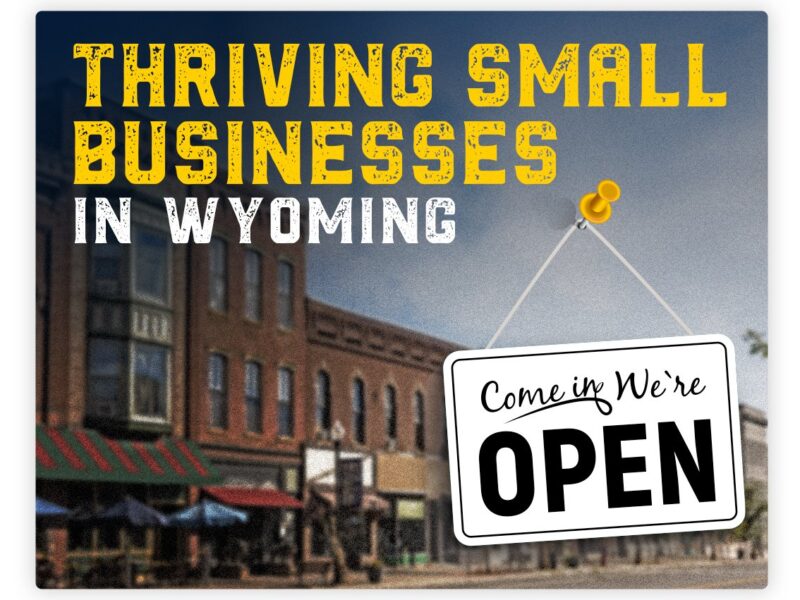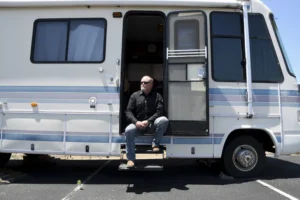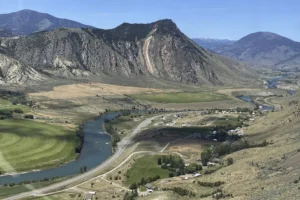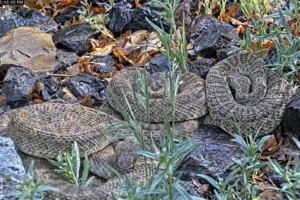THRIVING SMALL BUSINESSES IN WYOMING: Gillette Entrepreneur Turns Personal Challenge into Food Distribution Company
Matt Walker launched Equality State Farms to fill void in the state’s food supply chain
- Published In: Other News & Features
- Last Updated: May 22, 2023

By Jennifer Kocher
Special to the Wyoming Truth
GILLETTE, Wyo.– What began as an experiment has since flourished into a thriving food distribution company: Equality State Farms.

It started with a challenge. It was April 2020, and the pandemic was in full swing. Matt Walker, co-owner of Walker Inspection, LLC, a high-pressure testing company, was sidelined when work in the oil field came to a screeching halt.
Out of boredom, Walker, 37, decided to pursue his passion for gardening. He’d always grown vegetables and canned on a small scale with his wife and three children, but wanted to test the limits to see what he could cultivate on the hard-scrabbled, wind-swept prairie at 4,554 feet in Gillette.
“This is a crummy place to grow anything, and I was curious how much you could get done,” Walker said, as he poured grinds into the coffee maker in the breakroom of his sprawling headquarters off Highway 59 in Gillette. “I wondered if it was possible if you put your mind to it to grow actual farm products that you could sell and eat.”
Walker managed to find a handful of properties around the city to lease and began planting. By the end of that first growing season, Walker had reaped about 6,000 pounds of cucumbers, snap peas, squash, tomatoes, carrots, melons and other vegetables.
Walker approached schools in Campbell and neighboring counties to find out if they would be interested in purchasing locally sourced vegetables. They were. Walker sold the bulk of his produce to the schools; the food they didn’t take – like zucchini, squash and beets – was either sold at the local farmer’s market or canned.
After that first growing season with his experiment now complete, Walker was ready to return to his “day job.”
“I told myself this was a one-time thing,” he said. “I was done and was planning to go back to the patch.”
Breaks in supply chain
But as Walker learned about the food supply chain in Wyoming, he saw a system that was badly broken. For starters, there were no food distributors of scale in the state to shuttle supplies to schools, prisons, restaurants, food carts and other institutions. Instead, schools and restaurants were limited to big national distributors like Texas-based Sysco and Illinois-based U.S. Foods. Neither has a distribution warehouse in Wyoming; the nearest supply centers are in Colorado and Montana.
“The more I started to find out about how broken the system was, I realized we are just getting wiped out by huge vendors coming through and just snatching up our money and using it to build infrastructure in Colorado and Montana,” Walker said.

Customers also were also paying higher prices to make up for the cost of fuel to deliver to remote locations statewide. Plus there’s the problem of delivering any out-of-state products in Wyoming. When highways and roads close down due to inclement weather, customers sometimes must wait for up to three or four days until the roads are clear.
Meanwhile, Walker continued to grow vegetables for another season, adding a greenhouse and hydroponic lettuce operation, which he continued to sell to area schools. However, he realized there was no viability in his relatively low profit margins in the limited amount of produce he could grow each year. Nor could he compete with big farm operations out of California and elsewhere.
In 2022, Walker decided to switch gears: Instead of growing produce himself, he would launch Equality State Farms—a wholesale distributor—and create infrastructure to bridge the gap in Wyoming’s food chain.
Unchartered territory
Without experience in food distribution or processing, Walker reached out to experts for guidance; he also consulted school administrators and local restaurant owners about their needs.
“I talked to somebody new every day,” he said, “and failed at it 10 times before I got one thing accomplished.”
Last year, Walker leased an office with 12,000-square feet of cold storage in Gillette and a small fleet of delivery trucks. He hired a salesperson, bookkeeper, truck driver and marketing person to assist with social media and lined up 60 customers from schools, restaurants and local food trucks. He personally drove the truck to pick up produce from a Denver food supplier, which this winter, amounted to a lot of anxiety as he logged 16-hour days, white-knuckling it through ice and snowstorms.
Then, another networking opportunity presented itself: Walker was introduced to a representative at Frosty Acres Brands, a national sales and food purchasing cooperative that allows smaller, independent distributors more buying power and rebates.
Typically, Frosty Acres only works with large medium distributors who have at least $6 million in annual purchasing power. Equality State Farms wasn’t even close with a volume of around $300,000, but the cooperative took one look at Wyoming and decided to take Walker on anyway.
“They were like, ‘Holy cow, look at that black hole around you,’” Walker recalled. “There’s absolutely nobody to buy from.”

After joining the cooperative, Walker built two additional cold-storage warehouses in Riverton and Wheatland. Having more capacity in three locations in Wyoming has allowed him to expand his inventory and customer base.
This month, Walker convinced the Denver distributor to drop off shipments in Wheatland, saving him over 10 hours of driving time each week. It also allows Walker to sell products at prices comparable to the bigger national distributors while simultaneously providing better customer service by delivering directly to the schools and personally managing their orders.
Walker also is applying for licensure that will enable him to repackage meat and patty hamburgers for distribution. So far, Walker has invested about $2 million in warehouse space. And though he has yet to net a profit, he’s encouraged that sales approached $1 million during Equality State Farms’ inaugural year.
Walker has no intention to take on the large national distributors, but sees his company as a much-needed niche to build a viable food supply infrastructure. Based on Equality State Farms’ early growth, Walker expects to have 100 employees and $25 million in sales by the company’s fifth year in operation.
“It will happen fast with the inventory because it stacks,” he said, “and I don’t take no for an answer.”
A natural entrepreneur
This isn’t the first time that Walker has turned a random idea into a successful business. Along with the oil drilling company he started with his brother 13 years ago—it’s grown to over 100 employees with offices in five states—Walker has founded ranch and real estate businesses.
He thrives on the challenge of building something out of nothing, he said, and entrepreneurial work is a good outlet for his active brain and energy.
Already, Walker is looking forward to the new school year: Of Wyoming’s 59 school districts listed on the breakroom wall at Equality State Farms, his goal is to land every one of them as customers within the next five years.
“I learned early that there’s no real trick to making money,” he said. “It’s all out there, everywhere, laying around. You’ve just got to figure out your process and go get it.”













